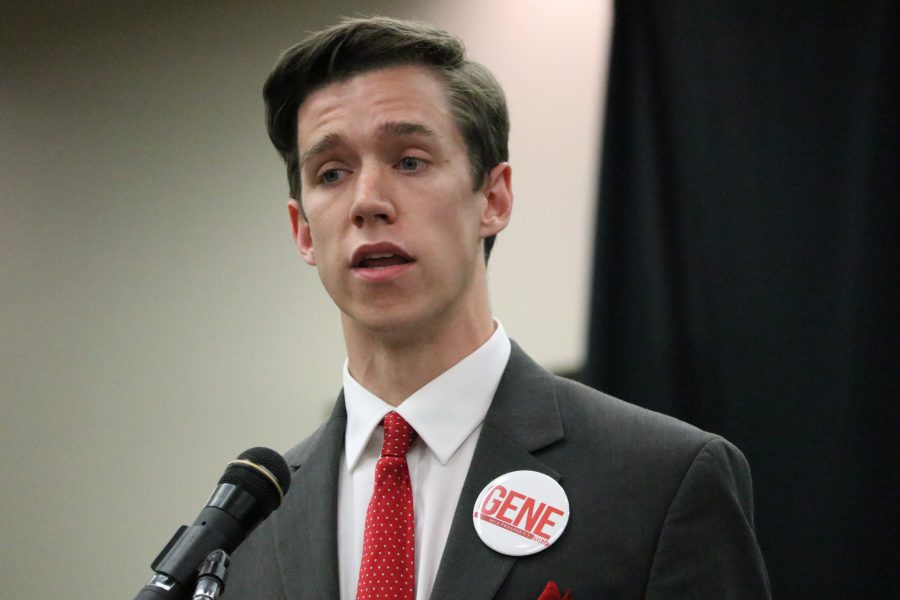SGA presidential candidate Gene Fulmer has been defined by his unpredictable relationships at The University of Alabama, which can be seen as a product of his small-town upbringing. Although born in Huntsville, Fulmer was raised in Fayette, Alabama. He describes the place of his roots as a town where “everyone knew everyone.” Being from a place that is unknown even to many Alabamians, the idea of going to a big school like the University of Alabama sometimes seemed like nothing more than a wish.
“UA was the focal point for me growing up,” Fulmer said. “It was my dream to be able to go there one day. I still get chills on this campus.”
Once a kid from a small town, Gene Fulmer is now a junior marketing major at his dream university and he has not taken that for granted. Fulmer’s SGA and non-SGA experience reflect his commitment to giving back to the University he feels blessed to be a part of. He has been a member of the senate and a member of the executive branch under the Director in Student Affairs. He is a two-year member of Al’s Pals, a mentoring program with local elementary school students, and is committed to programs that help those struggling with mental health problems such as the “End the Stigma” campaign. On top of that, Fulmer is a member of Calvary Baptist Church and the Alpha Kappa Psi business fraternity.
Of all the relationships Fulmer has built at Alabama, from a variety of students at “End the Stigma” programs, to his fellow colleagues in SGA, Fulmer feels the most important one of all is the one he has developed with his campaign manager, Ryan Murphy. The two met through Alpha Kappa Psi. On the surface, the two may not look like they have anything in common: one is from Fayette, the other is from Long Island, New York; one wants to go into sports marketing, the other wants to go to graduate school in Europe. However, what may look like an unusual pairing has turned into a great complement of each others’ strengths thanks to their similar goals and views for this university.
“I became good friends with Gene at a very pivotal time in my life,” Murphy said. “I was redefining things with myself and he really helped me with that.”
For Murphy, getting behind Fulmer’s campaign was something that he claims
“He is concerned about things that do not concern other people,” Murphy said. “He is choosing to put a voice to people’s struggles.”
With Murphy helping him every step of the way, Fulmer has built his platform around better ways to deal with the concerns of all the students while also looking to expand the inclusiveness of this university. At the beginning of his campaign, Fulmer conducted a survey of over 700 students asking about what issues they wanted
Fulmer has shown a huge commitment to mental health during his time at Alabama and is now using that as one of the most important issues in his campaign. An avid participant in “End the Stigma,” Fulmer is now supporting the rebranding of the program as the “Know the Five” campaign. According to Fulmer, this rebranding turns the movement into a proactive approach and will help students understand the warning signs around those struggling with mental health. He also believes that the crisis hotline that is available to UA students is not advertised enough.
“Mental health is often talked about in campaigns and then fades away after,” Fulmer said. “That needs to stop.”
Fulmer has played a part in rebranding “End the Stigma” and now wants to play a part in rebranding to whom the University is accessible. According to Murphy, Fulmer’s campaign will show a commitment to making the University of Alabama accessible to the deaf. Murphy said that upgrading the University’s facilities to accommodate the deaf as much as the blind or the mobility impaired would be a great step for Alabama.
“We need to set the precedent as the Capstone University,” Murphy said. “If we become accessible to the deaf, other schools in Alabama will follow.”
Running a grassroots campaign, Murphy says that they “have to be creative” in their campaign strategies. This includes using Livestream to build popularity around their plans and a huge commitment to small organizations on campus.
One creative piece of Fulmer’s platform is its call for the replacement of the President’s Council with the Student Leadership Council. This board of 30 student leaders would meet once a week to discuss issues directly with the students. Under this system, Fulmer said that more students’ voices would be heard in a more effective setting that is not run through SGA.
Normal days for the Fulmer campaign do not exist: they are constantly meeting with organizations they believe need a larger voice. They have turned to unorthodox social media strategies and have even dressed up in costumes on the quad to bolster attention. Fulmer’s small town of Fayette, Alabama has embedded in him the principle that no one is too small to make an impact, and he will continue running his campaign in such a way.
“I like making people feel welcome. Coming from a small town, I was grateful to be welcomed by the University,” Fulmer said. “I believe we have gotten away from our core values of students serving students.”









